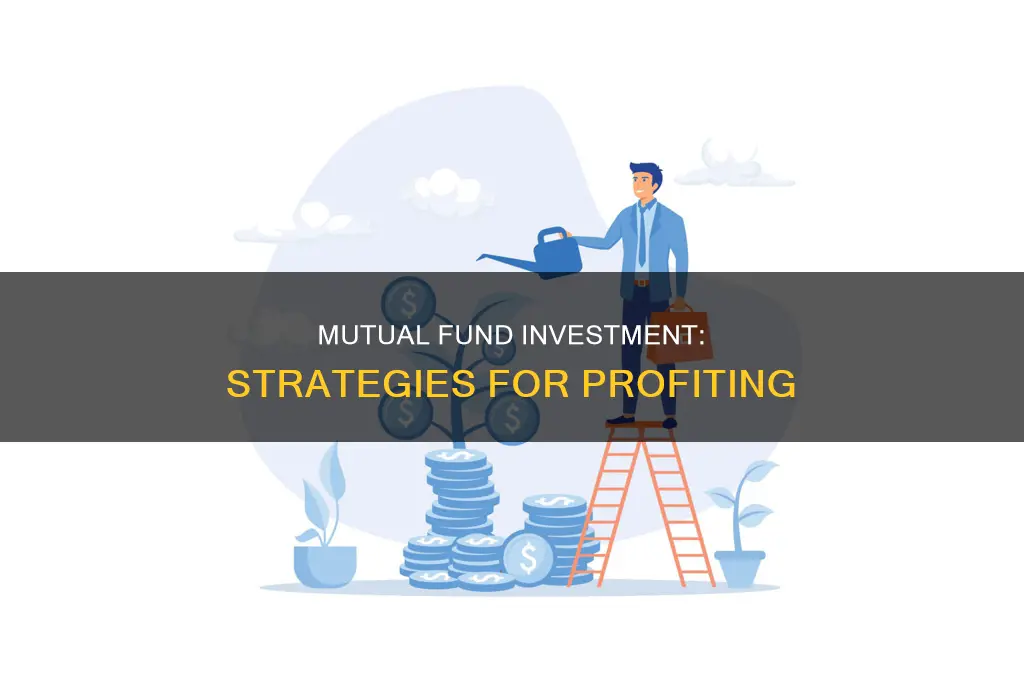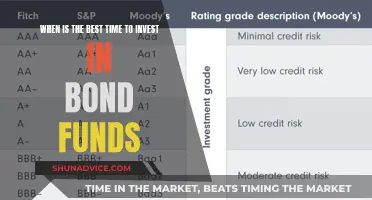
Mutual funds are a popular investment vehicle, especially for retirement accounts, as they are a relatively hands-off way to invest in many different assets at once. They are also a good option for investors who don't want to pick and choose individual investments but want to benefit from the stock market's high average annual returns.
Mutual funds are managed by professionals who invest the pooled capital according to a stated strategy. They are known for providing investors with access to a diversified, professionally managed portfolio, as well as economies of scale.
There are different types of mutual funds, such as stock, bond, money market, index, and target-date funds, each with its own investment focus and strategy. The returns on mutual funds come from distributions of income from dividends or interest and selling fund securities at a profit.
When investing in mutual funds, it is important to consider the fees involved, as these can eat into your investment returns. These fees include management fees, sales load fees, 12b-1 fees, redemption fees, account fees, and purchase fees, among others.
To profit from mutual fund investments, it is crucial to understand the fund's prospectus, invest in funds that align with your goals and risk tolerance, and adopt a long-term perspective, as mutual funds are typically considered a long-term investment.
| Characteristics | Values |
|---|---|
| Definition | A fund that owns a group of investments |
| Fund management | Hires a portfolio manager for a fee |
| Investment strategy | Defined in a document called the mutual fund prospectus |
| Investment types | Stocks, bonds, real estate, gold, etc. |
| Profit | Income from dividends, interest, capital gains, fund share price increases |
| Time horizon | Five years or more |
| Costs and fees | Expense ratio, sales/commission charges, deferred sales charges, redemption fees, account fees, exchange fees |
| Taxation | Depends on fund type |
| Advantages | Diversification, liquidity, professional management, economies of scale |
| Disadvantages | High fees, cash drag, difficulty in comparing funds, lack of transparency |
What You'll Learn

Understand the different types of mutual funds
Understanding the different types of mutual funds is crucial when considering how to profit from mutual fund investments. Mutual funds can be categorized in several ways, including the types of securities they invest in, their investment objectives, and the returns they seek. Here is an overview of some common types of mutual funds:
- Stock Funds: These funds primarily invest in equity or stocks. They can be further categorized based on the size of the companies they invest in, such as small-, mid-, or large-cap companies. They can also be classified by their investment approach, such as aggressive growth, income-oriented, or value funds. Stock funds offer the potential for higher returns but come with higher risks.
- Bond Funds: Bond funds focus on investing in government bonds, corporate bonds, and other debt instruments that provide a fixed rate of return. These funds aim for lower investment risk and generate interest income for investors.
- Money Market Funds: These funds invest in safe, short-term debt instruments, primarily government Treasury bills. While the returns are typically modest, money market funds offer low-risk options for investors.
- Balanced Funds: Also known as asset-allocation funds, balanced funds invest across various securities, including stocks, bonds, money markets, or alternative investments. The primary objective of these funds is to reduce risk through diversification.
- Index Funds: Index funds aim to replicate the performance of a specific market index, such as the S&P 500 or the Dow Jones Industrial Average (DJIA). They have a passive investment strategy, requiring less research, and often have lower fees passed on to investors.
- Target-Date Funds: Also known as life-cycle funds, these funds automatically adjust their asset allocation to lower risk as a target retirement date approaches. They are designed to become more conservative as the investor gets closer to retirement.
- International and Regional Funds: International funds invest in assets located outside of the investor's home country, while regional funds focus on specific geographic regions, such as a country, continent, or group of countries. These funds provide diversification and exposure to global markets.
- Sector and Theme Funds: Sector funds aim to profit from the performance of specific sectors like finance, technology, or healthcare. Theme funds cut across sectors, investing in companies that align with a particular theme, such as AI.
- Socially Responsible Funds: These funds invest only in companies and sectors that meet specific criteria, excluding industries like tobacco, alcoholic beverages, weapons, or nuclear power. Sustainable mutual funds, for example, focus on green technology and renewable energy.
When deciding how to profit from mutual fund investments, it is essential to understand the different types of mutual funds available, their investment strategies, risk profiles, and potential returns. Diversifying your portfolio across various types of mutual funds can help balance risk and maximize returns.
Stash Invest Account: Funding Your Future in a Few Steps
You may want to see also

Learn how mutual funds generate cash
Mutual funds are a popular investment choice because they offer professional management, diversification, affordability, and liquidity. They are also highly liquid, meaning they are easy to buy or sell.
- Dividend/interest income: Mutual funds distribute the dividends on stocks and interest on bonds held in their portfolio. Funds often give investors the choice to either receive a cheque for distributions or reinvest earnings for additional shares in the mutual fund.
- Portfolio distributions: If the fund sells securities that have increased in price, the fund realises a capital gain, which most funds pass on to investors in a distribution.
- Capital gains distribution: When the fund's shares increase in price, you can sell your mutual fund shares for a profit in the market.
- Economies of scale: Mutual funds buy and sell large amounts of securities at once, so their transaction costs are lower than what an individual investor would pay.
- Professional management: Mutual funds are managed by professional money managers who use research and skillful trading to make investment decisions. This relatively inexpensive service allows small investors to benefit from full-time management of their investments.
- Diversification: Mutual funds invest in a range of companies and industries, lowering the risk of losing money if a single company fails.
- Affordability: Most mutual funds have a low dollar amount for initial investment and subsequent purchases, making them accessible to a wide range of investors.
Unlocking the Schiehallion Fund: A Guide to Smart Investing
You may want to see also

Know the fees and costs associated with mutual funds
When investing in mutual funds, it's important to understand the fees involved, as these will impact your overall profits. Mutual funds charge various fees to make money, which can be categorised as follows:
Management Fees
The fund's investment advisor, administrative staff, research analysts and other operational costs are covered by management fees. These are paid out of the fund's assets and must be listed separately in the fund prospectus so that investors are aware of how much is being spent on management compensation.
Distribution Fees (12b-1 Fees)
These fees cover the costs of marketing the fund and providing shareholder services. Capped at 1% of the fund's assets, these fees are unavoidable as the SEC requires the printing and distribution of prospectuses to new investors.
Sales Charges or Loads
Sales charges are triggered when an investor purchases mutual fund shares. The most common type is the front-end load, which is deducted immediately when the shares are bought. There are also back-end loads, such as the contingent deferred sales charge (CDSC), which is charged when shares are sold and decreases over time until it reaches zero after seven to ten years.
Redemption Fees
Some funds charge a redemption fee when an investor sells their shares within a short period (usually 30-180 days) of purchasing them. This fee discourages short-term trading and is limited to 2% by the SEC.
Account Fees
Some funds or brokerage firms may charge extra for maintaining your account or transactions, especially if your balance falls below a certain minimum.
Expense Ratio
This annual fee covers the fund's operating expenses, including management fees, administrative costs and marketing expenses. It is expressed as a percentage of the fund's average net assets and is deducted from the fund's returns. The expense ratio has decreased significantly over the last few decades, largely due to competition from exchange-traded funds (ETFs).
It's important to note that mutual funds with higher fees do not always deliver better returns. When choosing a mutual fund, it's crucial to consider the fees and ensure they fit within your investment profile and goals.
Investing in Mutual Funds for Minors: A Step-by-Step Guide
You may want to see also

Decide between active and passive funds
When deciding how to profit from mutual fund investment, it is important to consider the differences between active and passive funds.
Active Funds
Active funds are those in which managers decide to buy or sell securities based on their expectations for how those securities will perform. Active funds take a hands-on approach, with managers making buy and sell decisions, selecting individual stocks and bonds according to a rigorous methodology and thorough company research. Active fund managers have a host of resources to help them track and respond to the market's ups and downs, as well as any positive or negative changes to individual companies' fundamentals.
The benefits of active funds include:
- Flexibility: Active managers can buy stocks they believe to be "diamonds in the rough".
- Hedging: Active managers can use short sales, put options, and other strategies to insure against losses.
- Risk management: Active managers can exit specific holdings or market sectors when risks become too large.
- Tax management: Active managers can employ strategies tailored to the individual investor, such as selling money-losing investments to offset taxes on winners.
However, there are also drawbacks to active funds:
- Very expensive: The average expense ratio for an actively managed equity fund is 0.68%, compared to only 0.06% for a passive equity fund.
- Active risk: Active managers are free to buy any investment they believe meets their criteria, which may not always work out.
- Management risk: Fund managers are human and can make costly investing mistakes.
Passive Funds
Passive funds, also known as index funds, are designed to mirror the performance of a specific index, such as the S&P 500, by holding the same or similar securities in the same proportions. Passive funds do not attempt to outperform a designated index but simply seek to mirror its performance. Trades within passive funds are automated, with little or no human decision-making involved, making them a popular choice for some investors.
The benefits of passive funds include:
- Ultra-low fees: Passive funds do not require the same level of analysis, so oversight is much less expensive.
- Transparency: It is always clear which assets are in an index fund.
- Tax efficiency: The buy-and-hold strategy of passive funds does not typically result in a large capital gains tax for the year.
However, there are also some drawbacks to passive funds:
- Too limited: Passive funds are limited to a specific index or set of investments, so investors are locked into those holdings regardless of market changes.
- Small returns: Passive funds will rarely beat the market, even during times of turmoil, as their core holdings are locked in to track the market.
- Reliance on others: Passive investors generally rely on fund managers to make decisions, so they do not have a say in what they are invested in.
Both active and passive funds have their advantages and disadvantages, and the best strategy for an investor may be to blend the two. Passive funds have dominated the market due to their lower fees, but some investors are willing to pay higher fees for the expertise of an active manager to guide them through volatile markets.
Ultimately, there is no right or wrong answer when it comes to choosing between active and passive funds. It is important to do your research and consider all your options before deciding which type of fund is right for you.
Invest in Mutual Funds: Quick and Easy Ways
You may want to see also

Choose a brokerage account
Choosing a brokerage account is an important step in investing in mutual funds. A brokerage account is an investment account opened through a brokerage firm. You can use a brokerage account to purchase investments, such as stocks, bonds, mutual funds, and ETFs.
- Account type: There are two main types of brokerage accounts: online brokerage accounts and managed brokerage accounts. With an online brokerage account, you can purchase and manage your investments through the broker's website. A managed brokerage account comes with investment management from a human investment advisor or a robo-advisor. A robo-advisor is a low-cost alternative that uses computer programs to manage your investments based on your goals and timeline.
- Affordability: Consider the fees associated with the brokerage account and the mutual funds offered. Mutual fund investors can face transaction fees from the brokerage account and expense ratios or sales loads from the funds themselves. Look for brokerage accounts that offer a wide range of no-transaction-fee funds.
- Fund choices: Evaluate the number and variety of mutual funds offered by the brokerage. Some brokers offer hundreds or even thousands of funds to choose from, while others may have more limited options. Consider your investment goals and risk tolerance when evaluating the fund choices.
- Research and educational tools: Choose a brokerage that provides comprehensive research and educational tools to help you make informed investment decisions. Look for brokers that offer analysis and insights on different funds, as well as resources to help you build and diversify your portfolio.
- Ease of use: Select a brokerage with a user-friendly website or app that you feel comfortable using. Consider the platform's navigation, functionality, and the availability of customer support.
- Fees: Be mindful of the fees charged by the brokerage firm, such as management fees, distribution fees (12b-1 fees), and account fees. These fees can impact your overall investment returns, so it's important to understand them before opening an account.
- Reputation and regulation: Ensure that the brokerage firm is reputable and regulated by relevant financial authorities. Check reviews and testimonials from other investors to gauge their experience with the brokerage firm.
- Customer service: Consider the level of customer support offered by the brokerage. Evaluate the availability and responsiveness of their customer service team, as well as the different channels through which you can reach them (phone, email, live chat, etc.).
By carefully considering these factors, you can make an informed decision when choosing a brokerage account for your mutual fund investments.
Invest Your Provident Fund: A Guide to Getting Started
You may want to see also
Frequently asked questions
Mutual funds make money by charging investors a percentage of the assets under management and may also charge a sales commission (load) upon fund purchase or redemption.
There are many types of mutual funds, including stock, bond, money market, index, and target-date funds. Each has its own investment focus and strategy.
It's important to choose a mutual fund that aligns with your financial goals, investment horizon, and risk tolerance. If you're risk-averse, consider debt mutual fund schemes. If you're willing to take on more risk for higher returns, consider equity mutual fund schemes.
Mutual funds offer several benefits, including diversification, professional management, and economies of scale. They provide access to a diversified portfolio of assets that are professionally managed. Additionally, mutual funds can be more cost-effective than investing individually due to the pooling of funds.







